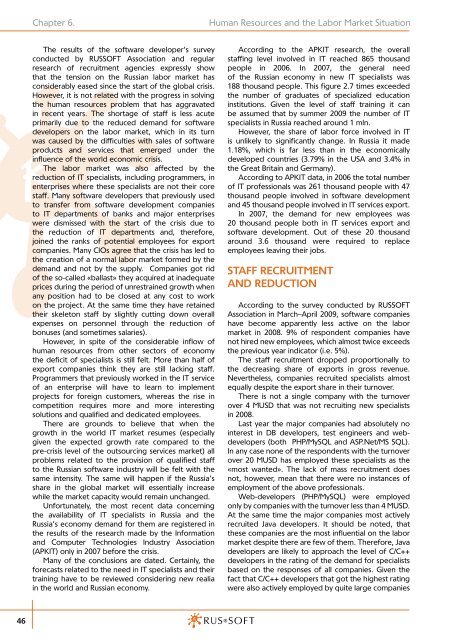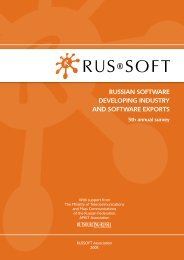russian software developing industry and software exports
russian software developing industry and software exports
russian software developing industry and software exports
Create successful ePaper yourself
Turn your PDF publications into a flip-book with our unique Google optimized e-Paper software.
Chapter 6.<br />
Human Resources <strong>and</strong> the Labor Market Situation<br />
The results of the <strong>software</strong> developer’s survey<br />
conducted by RUSSOFT Association <strong>and</strong> regular<br />
research of recruitment agencies expressly show<br />
that the tension on the Russian labor market has<br />
considerably eased since the start of the global crisis.<br />
However, it is not related with the progress in solving<br />
the human resources problem that has aggravated<br />
in recent years. The shortage of staff is less acute<br />
primarily due to the reduced dem<strong>and</strong> for <strong>software</strong><br />
developers on the labor market, which in its turn<br />
was caused by the difficulties with sales of <strong>software</strong><br />
products <strong>and</strong> services that emerged under the<br />
influence of the world economic crisis.<br />
The labor market was also affected by the<br />
reduction of IT specialists, including programmers, in<br />
enterprises where these specialists are not their core<br />
staff. Many <strong>software</strong> developers that previously used<br />
to transfer from <strong>software</strong> development companies<br />
to IT departments of banks <strong>and</strong> major enterprises<br />
were dismissed with the start of the crisis due to<br />
the reduction of IT departments <strong>and</strong>, therefore,<br />
joined the ranks of potential employees for export<br />
companies. Many CIOs agree that the crisis has led to<br />
the creation of a normal labor market formed by the<br />
dem<strong>and</strong> <strong>and</strong> not by the supply. Companies got rid<br />
of the so-called «ballast» they acquired at inadequate<br />
prices during the period of unrestrained growth when<br />
any position had to be closed at any cost to work<br />
on the project. At the same time they have retained<br />
their skeleton staff by slightly cutting down overall<br />
expenses on personnel through the reduction of<br />
bonuses (<strong>and</strong> sometimes salaries).<br />
However, in spite of the considerable inflow of<br />
human resources from other sectors of economy<br />
the deficit of specialists is still felt. More than half of<br />
export companies think they are still lacking staff.<br />
Programmers that previously worked in the IT service<br />
of an enterprise will have to learn to implement<br />
projects for foreign customers, whereas the rise in<br />
competition requires more <strong>and</strong> more interesting<br />
solutions <strong>and</strong> qualified <strong>and</strong> dedicated employees.<br />
There are grounds to believe that when the<br />
growth in the world IT market resumes (especially<br />
given the expected growth rate compared to the<br />
pre-crisis level of the outsourcing services market) all<br />
problems related to the provision of qualified staff<br />
to the Russian <strong>software</strong> <strong>industry</strong> will be felt with the<br />
same intensity. The same will happen if the Russia’s<br />
share in the global market will essentially increase<br />
while the market capacity would remain unchanged.<br />
Unfortunately, the most recent data concerning<br />
the availability of IT specialists in Russia <strong>and</strong> the<br />
Russia’s economy dem<strong>and</strong> for them are registered in<br />
the results of the research made by the Information<br />
<strong>and</strong> Computer Technologies Industry Association<br />
(APKIT) only in 2007 before the crisis.<br />
Many of the conclusions are dated. Certainly, the<br />
forecasts related to the need in IT specialists <strong>and</strong> their<br />
training have to be reviewed considering new realia<br />
in the world <strong>and</strong> Russian economy.<br />
According to the APKIT research, the overall<br />
staffing level involved in IT reached 865 thous<strong>and</strong><br />
people in 2006. In 2007, the general need<br />
of the Russian economy in new IT specialists was<br />
188 thous<strong>and</strong> people. This figure 2.7 times exceeded<br />
the number of graduates of specialized education<br />
institutions. Given the level of staff training it can<br />
be assumed that by summer 2009 the number of IT<br />
specialists in Russia reached around 1 mln.<br />
However, the share of labor force involved in IT<br />
is unlikely to significantly change. In Russia it made<br />
1.18%, which is far less than in the economically<br />
developed countries (3.79% in the USA <strong>and</strong> 3.4% in<br />
the Great Britain <strong>and</strong> Germany).<br />
According to APKIT data, in 2006 the total number<br />
of IT professionals was 261 thous<strong>and</strong> people with 47<br />
thous<strong>and</strong> people involved in <strong>software</strong> development<br />
<strong>and</strong> 45 thous<strong>and</strong> people involved in IT services export.<br />
In 2007, the dem<strong>and</strong> for new employees was<br />
20 thous<strong>and</strong> people both in IT services export <strong>and</strong><br />
<strong>software</strong> development. Out of these 20 thous<strong>and</strong><br />
around 3.6 thous<strong>and</strong> were required to replace<br />
employees leaving their jobs.<br />
STAFF RECRUITMENT<br />
AND REDUCTION<br />
According to the survey conducted by RUSSOFT<br />
Association in March–April 2009, <strong>software</strong> companies<br />
have become apparently less active on the labor<br />
market in 2008. 9% of respondent companies have<br />
not hired new employees, which almost twice exceeds<br />
the previous year indicator (i.e. 5%).<br />
The staff recruitment dropped proportionally to<br />
the decreasing share of <strong>exports</strong> in gross revenue.<br />
Nevertheless, companies recruited specialists almost<br />
equally despite the export share in their turnover.<br />
There is not a single company with the turnover<br />
over 4 MUSD that was not recruiting new specialists<br />
in 2008.<br />
Last year the major companies had absolutely no<br />
interest in DB developers, test engineers <strong>and</strong> webdevelopers<br />
(both PHP/MySQL <strong>and</strong> ASP.Net/MS SQL).<br />
In any case none of the respondents with the turnover<br />
over 20 MUSD has employed these specialists as the<br />
«most wanted». The lack of mass recruitment does<br />
not, however, mean that there were no instances of<br />
employment of the above professionals.<br />
Web-developers (PHP/MySQL) were employed<br />
only by companies with the turnover less than 4 MUSD.<br />
At the same time the major companies most actively<br />
recruited Java developers. It should be noted, that<br />
these companies are the most influential on the labor<br />
market despite there are few of them. Therefore, Java<br />
developers are likely to approach the level of C/C++<br />
developers in the rating of the dem<strong>and</strong> for specialists<br />
based on the responses of all companies. Given the<br />
fact that C/C++ developers that got the highest rating<br />
were also actively employed by quite large companies<br />
46








